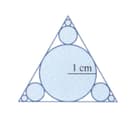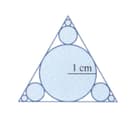Sue Pemberton Solutions for Chapter: Series, Exercise 10: EXERCISE 6E
Sue Pemberton Mathematics Solutions for Exercise - Sue Pemberton Solutions for Chapter: Series, Exercise 10: EXERCISE 6E
Attempt the practice questions on Chapter 6: Series, Exercise 10: EXERCISE 6E with hints and solutions to strengthen your understanding. Cambridge International AS & A Level Mathematics : Pure Mathematics 1 Course Book solutions are prepared by Experienced Embibe Experts.
Questions from Sue Pemberton Solutions for Chapter: Series, Exercise 10: EXERCISE 6E with Hints & Solutions
The first three terms of a geometric progression are . Given that all the terms in the progression are positive, find the sum to infinity.
The first three terms of a geometric progression are . Find the value of .
The first three terms of a geometric progression are . Find the sum to infinity.
The fourth term of a geometric progression is and the sum to infinity is five times the first term. Find the first term.
A geometric progression has first term and common ratio . The sum of the first three terms is and the sum to infinity is . Find the value of and the value of .
The first term of a geometric progression is and the second term is , where . Find the set of values of for which this progression is convergent.
A circle of radius cm is drawn touching the three edges of an equilateral triangle.Three smaller circles are then drawn at each corner to touch the original circle and two edges of the triangle.This process is then repeated an infinite number of times, as shown in the diagram. Find the sum of the circumferences of all the circles.

A circle of radius cm is drawn touching the three edges of an equilateral triangle.Three smaller circles are then drawn at each corner to touch the original circle and two edges of the triangle.This process is then repeated an infinite number of times, as shown in the diagram. Find the sum of the areas of all the circles.

